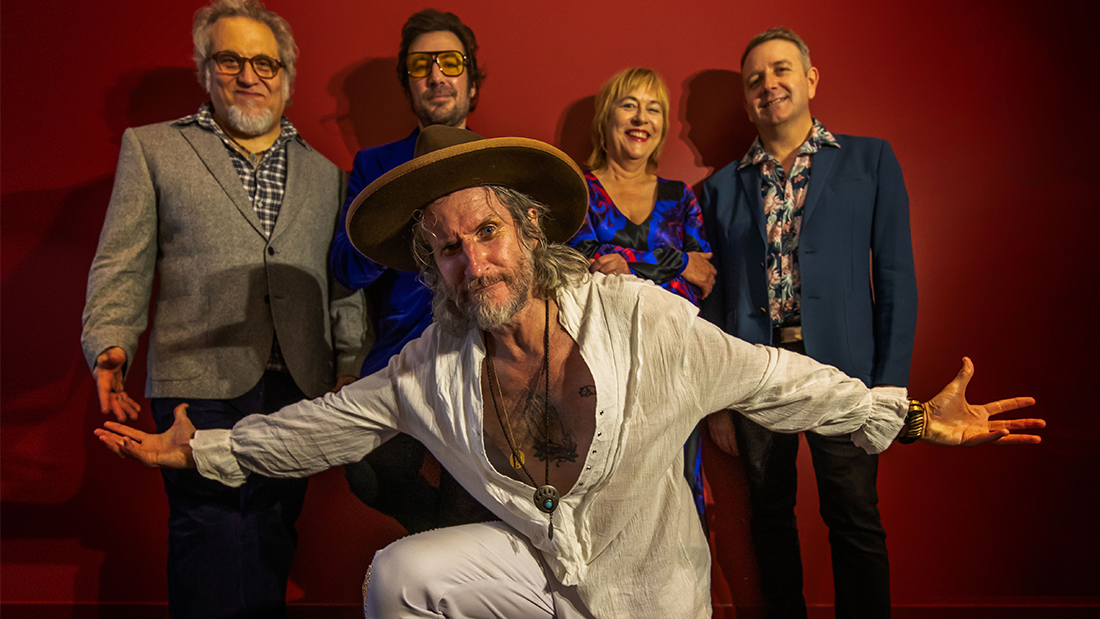
Tim Rogers finds rhyme and reason with new Twin Set album
Tim Rogers & The Twin Set have just released Tines Of Stars Unfurled, the follow up (and response) to 1999’s What Rhymes With Cars And Girls. BOB GORDON spoke to Rogers in the lead-up to their shows at Froth Craft Brewery in Bunbury on Saturday, March 4 and Freo.Social on Sunday, March 5.
In 1999 What Rhymes With Cars And Girls came out and I remember reading interviews at the time and it looked a bit as though you’d created a rod for your back with that title. It seemed you were asked the question in almost every interview – ‘So Tim, what rhymes with cars and girls?’ and you often replied, ‘fish and chips.’ All these years later, Tines Of Stars Unfurled, seems much more elegiac and indeed, it does rhyme…
Well, it had been rattling around in my head… not for 23 years, but perhaps the last five, because when I started writing songs as responses to the songs on Cars And Girls and spoke a bit about it to Jen (Anderson) and Davey (Lane) about a year-and-a-half ago. I think I even mentioned it to Aidan Fennessy, who wrote the What Rhymes With Cars And Girls stage play, that this idea had started onstage and maybe I’d attempt a sequel and I would like the title and the arc of it to rhyme with cars and girls.
There’s no question mark on What Rhymes With Cars And Girls (laughs). The whole thing started – I don’t think I’ve ever properly explained it – but I started writing these folkish songs in West Hollywood when I was living over there. Probably Rusty (Russell Hopkinson, You Am I drummer) and I were listening to a Dictators record, and there’s a song on it (sings) ‘cars and girls, cars and girls.’ And I was listening a lot to Bruce Springsteen – and the penny hasn’t dropped on Bruce with me, I look forward to it – but this title came to me, What Rhymes With Cars And Girls. You know, my favourite first 500 songs before I heard The Slits were all about cars and girls. And then the artist Ed Fotheringham who did the artwork said, ‘let’s not put the question mark at the end of the title and let’s just put it in disparately over the record.’
I was down in Tasmania with my partner Alice last year and we’d had a bit of a lysergic evening. She’s working on a ballet and I’m working on the drinks rider for the ballet and so we’re in Tasmania and I look up in the sky and there’s a pitchfork of stars above my head and Tines Of Stars Unfurled came to me in a rush like some art forms do. Particularly with music – because it can be quite loose with concepts and often it’s a little opaque and you don’t need to cross all the I’s and dot all the T’s – but when this pitchfork of stars came but I thought, ‘Tines Of Stars Unfurled actually rhymes with What Rhymes With Cars And Girls.’
And it was just after my father died, so I thought maybe it’s a little thing from my father. Maybe not. I don’t know if he really knew the record but sometimes you do these things and they make sense later on. And a lot of things with this record, in particular, are making sense later. Whether it’s something that Jen will say to me, you know, months after we’ve recorded it or played a song and she’ll mention something that happened 23 years ago. There’s a lot of confluence and serendipity and coincidence and it kind of spooks me at about 3am. Now it’s fine, but at 3am it’s a fucker.
Would you say the stage play was a catalyst for this? Perhaps you hadn’t bargained on the kind of self-examination that might happen?
That’s a great question about that self-examination because no, I didn’t. And I think because with a number of the songs the only person who could understand them was Tracy, who was my partner at the time, and we were breaking up. And it wasn’t a bad breakup, it was just an extraordinarily sad breakup. There wasn’t animosity, we were just at this stage of life where things were happening and we possibly didn’t understand them. Tracy and I still, you know, are very possibly the best of friends even though she lives in Palm Springs, California, but we couldn’t quite understand them. And I think she, like me, will use art or aesthetic beauty as a way of understanding. Her father was a songwriter, and we’ve always used that.
So I was thinking and I was reading the American writer Jennifer Egan, a novelist, and she wrote a book called The Candy House that came out a year ago and I had to review it for an ABC book show. It’s sort of a sequel to her previous book, A Visit From The Goon Squad. It was the way she talks about it, and maybe that was a prod as well. So rather than thinking I needed to write some wrongs – as I’ve said in the past – it was a bit of just a writing exercise as well. You know, can you examine something you’ve done before and try and refresh yourself, or reinvigorate it for yourself?
To have this sort of focus on something that you’ve done when so many years have passed and you are the same person but just due to the passing of time and experience, you are also markedly different, was that liberating as a writer?
Writing to spec is strangely liberating. All of the songs went through, I think five or six iterations and stylistically and even lyrically, stylistically. I really wanted to whittle away, and some are light-hearted and most aren’t, but some are and writing to spec is for this kind of troubadour bullshit that we frame ourselves as, is strangely liberating because if you’re writing it may happen in an hour. I’m drinking and I’ve been travelling all day and doing some work and I might sit down and write a song about nothing in an hour.
And that will be an experience, but if someone says, ‘Rogers can you write a song about being a young transgender woman living in Whyalla?’ – well struth, then that’s a challenge. And challenges sometimes are liberating, they’re not confronting. And I’m gonna say writing a song as a transgender person in Whyalla, I know nothing about that experience. And of course, I’ll spend days and weeks wondering, ‘how can I represent that?’ but if you’re being asked to represent something, then you give it consideration and you do research and you talk to people and you think a lot about it and in the end, you might just go ‘no, I don’t have the right, or the humanistic skill to do that.’ And so you just leave it alone, but at least you do the research and when I say research, I mean, that you really have to go deep on it.
But I didn’t do that at all on this record. It was flights of fancy… but writing for spec is strangely liberating.
There’s a song that seems to represent what everything else is about on the album. That’s 22, which is the answer or the complement to 28 from the original record. It ponders your daughter Ruby’s life as she turns 22 and faces the world. For me, there’s two things here – one is the simple fact that between this album and the first one, you are old enough to have a daughter of that age. Secondly, in the first album when you were 28 you were a young man writing everything from your place in the world, but all these years later, you’re writing about your daughter, so it’s moved on from you…
Oh yeah. The obvious response or sequel to 28 is (sings) ‘Hey I’m 53, got a dick like a tree’ (laughs). I wrote a number of drafts for a compatible song. The song started out as 21, about Ruby turning 21 and that was pretty much at the apex or the first minor relief from the pandemic, and she as a young kid in New York, it was quite something listening and watching her navigate that process.
I thought, ‘well, let’s not do 21 because that’s a significant age. Let’s do 22 it’s not quite so iconic.’ That’s one of the ones that’s lyrically a bit opaque because you know, I don’t know about the minutiae of my daughter’s life and, and so it’s just a dorky parent’s appraisal of their kid’s life where you’re just in awe of them. You don’t love everything they do, but you’re in awe of the way that they can navigate things without the tension and anxiety that their parents do.
I really like the song, it’s very difficult to sing. There’s a couple of songs that are very difficult to sing and I think that having Davey play on it, and Jen, having those people around, we’ve kind of got each other’s back. It’s the weird thing about emotional songs – you write things because you want to understand the depths of experience, but they’re fucking difficult to sing sometimes and thank Christ I’ve got great bandmates where we can back each other up.
With the Twin Set shows, in terms of the songs, given they are responses to the older songs, how do you structure the set? Do you take that part literally or are the live shows a different matter?
Oh the shows are a different matter. I think you’ve got to try and – as much as you at times, despise audiences (laughs) – you’ve got to respect that you don’t know what they’ve had going on during the day. And you have to listen to them.
And so no, the shows, I hope, each night are different. You’ve got to try and read the room. I think reading the room is a good thing to do as a human. And as a performer, why not be anything less than human? And so having a structure to a show helps you as a band, but I like to make my band feel nervous. Because they’re all so dexterous and gorgeous and beautiful and wonderful. (Laughs) So fuck ‘em, you know?
That’s the spirit.
Fuck it, I bring the looseness!
